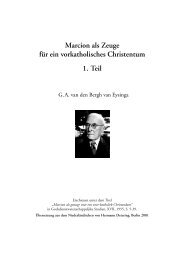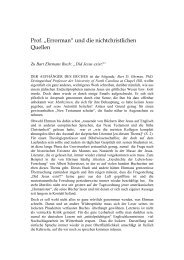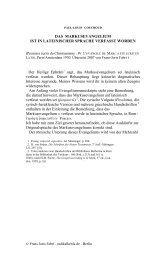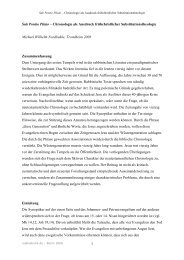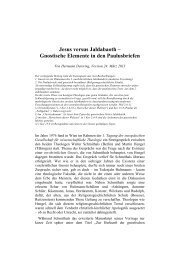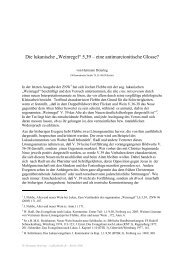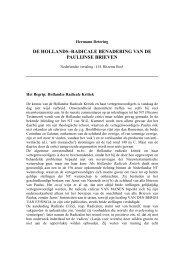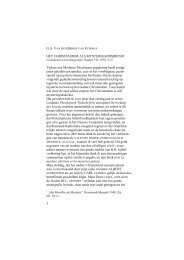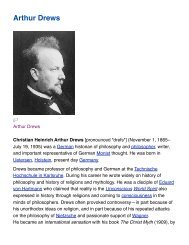- 10 -3.2 The Denial of Jesus Historicity is not a Movement<strong>Drews</strong> emphasized that deniers (radicals, mythicists) do not form a movement (a socalled"denial party") trying to “unite” them against an entity called “Christianity”:“It is quite understandable that the denial party is unique only in that point [of the nonhistoricity,"Ahistorizität"], and otherwise offers a variety of diverging explanations [eachdenier has his own independent theory]. The church has done everything for 2000years to obscure and hide away the origins of Christianity, so that there’s no way toget any further without speculative hypotheses.It is obvious that no seriousresearcher could claim the historicity of Jesus, unless it were the savior of thedominating religion of the prevailing culture. So there’s nothing but Christianprejudice which keeps even secular researchers from admitting non-historicity,except of course the small minority of those who do.”3.3 A Counter to Schweitzer's Quest of the Historical JesusNote that The Denial of the Historicity of Jesus in Past and Present of 1926 was meantto be <strong>Arthur</strong> <strong>Drews</strong>’s pendant response to Albert Schweitzer's Quest of the HistoricalJesus of 1906. <strong>Drews</strong>’s book is constructed as a “Quest of the non-Historicity ofJesus”, in a similar fashion of a historical review of the key advocates. As Schweitzererected himself as the champion of historicists, <strong>Drews</strong> stood up in opposition as thechampion of radicals and Jesus deniers, to be later labeled "mythicists".Although<strong>Drews</strong> was intellectually on the other side of the controversy about the historicity ofJesus from Albert Schweitzer, Hoffers notes that <strong>Drews</strong> "was temporarily a friend ofAlbert Schweitzer, the famous theologian and physician".3.4 The Five Major Influences on <strong>Drews</strong>'s Christ MythAmong those Jesus deniers, <strong>Arthur</strong> <strong>Drews</strong> was especially influenced by the followingthinkers:▪ The German Bruno Bauer (1809–1882), the original pioneer of the denial of JesusHistoricity▪ The American William Benjamin Smith (1850–1934), fluent in both English andGerman: 1906/1911, The Pre-Christian Jesus, Studies of Origins of PrimitiveChristianity; 1912, Ecce Deus: Studies Of Primitive Christianity, Introd. Paul W.Schmiedel.▪ The Scot J. M. Robertson (1856–1933): 1900-10, Christianity and Mythology; 1902, AShort History of Christianity; 1903–1911, Pagan Christs - Studies inComparative Hierology.▪ The Englishman Thomas Whittaker (1856–1935): 1904, The Origins of Christianity,declaring Jesus a myth.▪ The German Albert Kalthoff: 1904, Die Entstehung des Christentums - Neue Beiträgezum Christusproblem, Transl. 1907 The Rise of Christianity; 1904 Was wissenwir von Jesus? Eine Abrechnung mit Wilhelm Bousset; 1906, ModernesChristentum.4 International Influence of <strong>Drews</strong>'s Christ Myth4.1 Criticism in the United States<strong>Drews</strong>'s international popularity was confirmed by the New York Times's critical reviewof his Christ Myth book on March 26, 1911, A German's Christ Myth: Prof. <strong>Arthur</strong><strong>Drews</strong> Carries the Higher Criticism to the Point of Absurdity. The anonymous reviewerrecites the current objections addressed to the Christ Myth Theory. He lists the majorcriticisms addressed by theologians to the Christ Myth Theory, denouncing"the pseudo-scientific vagaries... in a style redolent of the professorial chair of aGerman pedant...[ Jesus's] characteristics...are derived from Jewish ideals floating in
- 11 -the air at the time...This mythical personage was transformed into a demigod by St.Paul...virtually the creator of Christianity. His main grounds for disbelief in the existenceof Jesus are the absence of any contemporary references to him except in theGospels — a rather large exception, one would think. Passages of Josephus, Tacitusand Pliny are explained away as being late, or interpolated, or applying to the mythrather than to the person...Dr. <strong>Drews</strong> proceeds ruthlessly to remove even this kernel[of a gracious life, with its marked individuality left by liberal theologians] and leavesvirtually nothing in its place except a mass of floating ideas and ideals...concentratedaround a non-existent personality...[Prof. <strong>Drews</strong>] denies the originality of the sayingsattributed to Jesus, and considers them tainted with other-worldliness...[his book] is anargument in favor of...monism...known as Pantheism...It is, however, just the sort ofpresentment which attracts the half-baked mind that cannot judge of historicevidence." [52]4.2 Acceptance in the Soviet UnionDrew's Christ Myth theory was to find an unpredictable reception in the East, as hisideas reached the new Soviet Union due to a very circuitous historical progress — as adistant aftermath of the splash made one hundred years earlier by the philosophy ofHegel and the reactions of his students.4.2.1 Ludwig Feuerbach Heads the Young Hegelians: Man Created GodAfter the death of Hegel (1770–1831), the Young Hegelians followed as their newmentor Ludwig Feuerbach (1804–1872), a student of Hegel, who strove to go beyondHegel in completely separating philosophy from religion. In Das Wesen desChristentums (1841), translated as The Essence of Christianity by George Eliot,Feuerbach followed his naturalistic stance and affinity for Spinoza's atheism. Heasserted that God was a projection of man's inner divine nature. God had not createdman, but it was mankind as a species that had created the image of God. Aradical thinker, Feuerbach urged that all religions had to be eliminated, along with theirtools of using deception to instill fear and invoking the mystical powers ofGod.[53][54]Young Karl Marx (1818–1883) adopted this radical view of religion and atheism, butmodified it by giving priority to the material and social conditions that favored the riseand power of religion. With Friedrich Engels (1820–1895), he developed his dialecticalmaterialism calling for a political separation of state from religion. The Young Hegelianswere being labeled Left or Right Hegelians according to their stance on the question ofstate and religion.4.2.2 Bruno Bauer Splits from Karl Marx and Friedrich EngelsBruno Bauer, also started as a student of Hegel and a Young Hegelian. He alsobecame a close friend of the young Marx from 1839 to 1841. But he rejected thesocialist and communist manifesto promulgated by Marx and Engels. Bruno Bauer wasmore interested in analyzing the influence of Hellenistic philosophy on earlyChristianity, and developing a Rationalist vision of theology.In 1842, Bauer, only 33, was forced to quit his professorship in Bonn on account of hisRationalism, described as "atheism" by the conservative professors of his university.He never taught again, and spent his life deconstructing the New Testament, andfocusing on the Greco-Roman input in the theology of early Christianity. He becameconvinced that the Gospel of Mark was the original story of Jesus. And came to theconclusion that the Gospel stories were pure fiction, regarding Mark as the soleinventor of the Gospel stories and of Jesus historicity. Bruno Bauer, bytemperament a radical all the way, adopted the view that the Pauline epistles were2d-century forgeries meant to counteract the character of Paul in the Acts.4.2.3 <strong>Drews</strong>'s Christ Myth Broadcasts Bruno Bauer's Theory to the World<strong>Drews</strong>, through the mediation of Albert Kalthoff, had been exposed to Bruno Bauer'sideas and adapted them into the monism inherited from his own mentor Eduard von


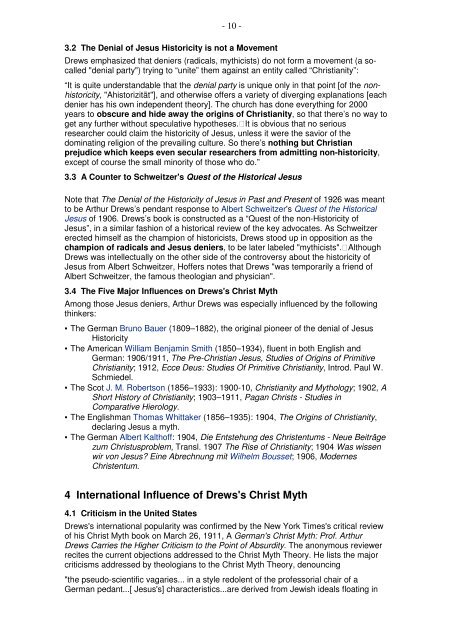
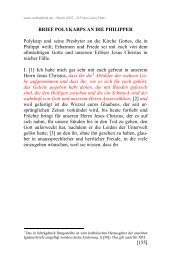
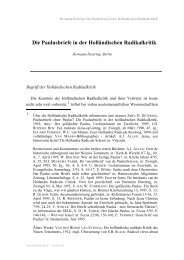
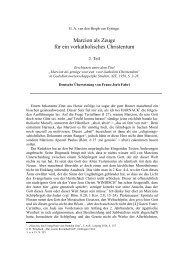
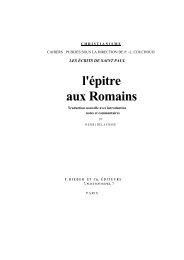
![[1] quibus tamen interfuit et ita posuit - Radikalkritik](https://img.yumpu.com/28285180/1/184x260/1-quibus-tamen-interfuit-et-ita-posuit-radikalkritik.jpg?quality=85)
